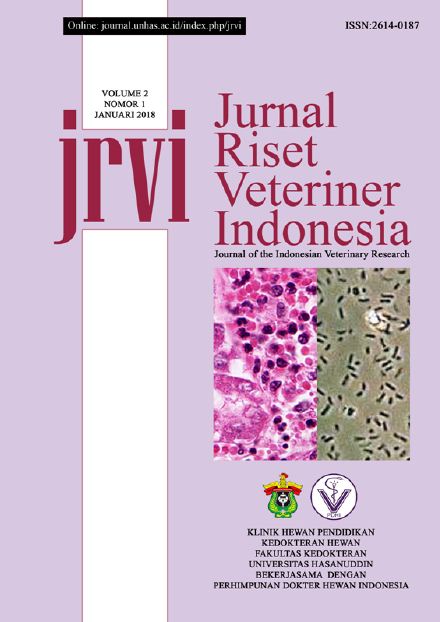Abstract
Incidence of drug overdose during treatment of acute disease consequently leads to serious renal damage. As supporting treatment, administration of herbal medicine and food dietary are frequently developed. This research aimed to prove how the administration of avocado juice could lower the BUN and creatinine level in white rats induced with toxic doses of meloxicam. Meloxicam is a non-steroidal anti-inflamatory drug (NSAID), which is effectively used as an anti-inflamatory, analgesic, and antipyretic. Twenty four (24) male Wistar rats were assigned to 4 groups of six rats each (n=6). 1 ml of CMC 1% was administered to Control Group I, 30 mg/kgBB meloxicam and 1 ml of CMC 1% to Control Grup II, 30 mg/kgBB meloxicam and avocado juice 5 g/kgBB/day to Treatment Group I, and 30 mg/kgBB meloxicam and avocado juice 10 g/kgBB/day to Treatment Group II. The study was conducted over 8 days, then the level of Blood Urea Nitrogen and creatinine of the white rats were examined on the 1st and 8th day. The results were analyzed by Anova Two Way With Replication, then followed by T-test (α = 0,05) if there were difference. The Anova Two Way With Replication test showed that the mean of the four groups either the levels of Blood Urea Nitrogen or creatinine was significantly decreased (p<0,05). The decrease of BUN in the treatment group I was 27,17 27,17mg/dl and 17,83mg/dl while the decrease of creatinine level was 0,983mg/dl and 0,713mg/dl. The conclusion of this study was that avocado juice decreases level of Blood Urea Nitrogen and creatinine in white rats which exposed toxic doses of meloxicam.
References
Adeneye, Olagunju, Benebo, Elias, Adisa, Idowu, Oyedeji, Isioyo, Braimoh, Oladejo, dan Alana. 2008. Nephroprotective Effects of The Aqueous Root Extract of Harungana madagascariensis (L.) in Acute and Repeated Dose Acetaminophen Renal Injured Rats. International Journal of Applied Research in Natural Products. 4 (1), 6-14
Almatsier, Sunita. 2001. Prinsip Dasar Ilmu Gizi. Edisi 1. Jakarta: Gramedia Pustaka Utama
Al-Rekabi, F. M., Abbas, D. A., Hadi, N. R. 2009. Effects of subchronic exposure to meloxicam on some hematological, biochemical and liver histopathological parameters in rats. Iraqi Jurnal 23 (2), 249-254
Barrett, B. J., and Parfrey, P. S. 2006. Preventing Nephropathy Induced by Contrast Medium. N Engl J Med. 354(2), 379-386.
Berdanier, C., Dwyer, J., and Feldman, E. 2007. Handbook of Nutrition and Food. Second Edition. Boca Raton: CRC Press. Pg: 67-96
Brater, D.C. 1999. Effects of nonsteroidal anti-inflammatory drugs on renal function: focus on cyclooxygenase-2-selective inhibition. Am. J. Med. 107, 65-71.
Christian, E. 2013. Anti-motility and reductions in the concentrations of gut electrolytes: Bases for the anti-spastic use of the leaves of Persea americana in folk medicine. Int J Pharm Sci 6(2), 336-341
Dorantes, Lidia, FAO. 2006. Avocado Post Harvest Operation Chapter. Accessed on April 21th, 2015.http://www.fao.org/inpho/content/compend /text/ch30/ch30_01.htm
Geof, W., and Jenifer, L. 2008. Extralabel Use of Nonsteroidal anti-inflamatory Drugs in Cattle. JAVMA.232 (5), 227-231
Girindra, A. 1986. Patologi Klinik Veteriner. Fakultas Kedokteran Hewan IPB.
Ietje, W., Rini, M., Bayu, F., Anggara, A. 2012. Anti Lithiasis Activity of Avocado (Persea americana Mill) Leaves Extract in White Male Rats. Hayati J BioSc 19 (1), 49-52
Mohora, Greabu, Muscurel, Duta, and Totan. 2007. The Sources and the Targets of Oxidative Stress in the Etiology of Diabetic Complications. J. Biophys. 17 (2), 63–84.
Montesinos, A., Ardiaca, M., Gilabert, JA, Bonvehj, Oros, J., and Encinas, T. 2016. The pharmacokinetics of Meloxicam After Intravenous, Intramuscular and Oral Administration of a Single Dose to African Gray Parrots (psittacus Erithacus) , A vet Pharmacol. Therap 10.1111
Ng, Lin Eng. 2008. The Action Of Diclofenac And Meloxicam On nephrotoxic Cell Death. National University of Singapore. Department of Biochemistry. Master Thesis.
Noer, MS 2006. Evaluation of Renal Function In laboratory (Laboratoric Evaluation on Renal Function). Airlangga University. Faculty of Medicine, Pediatrics. Master Thesis
Palani, Senthilkumar, Kumar, Devi, Venkatesan, and Sathendra. 2008. Effect of the Ethanolic Extract of Indigofera barberi (L) in Acute Acetaminophen - Induced Rats nephrotoxic. Advanced Biotech. 5 (2), 28-31.
Papich, MG 2008. An Update on Nonsterodial Anti-inflammatory Drugs (NSAIDs) In Small Animals. Veterinary Clinics of North America: Small Animal Practice, 38, 1243-1266.
Patty, H., Kelli L., Erin, K., and Charles, W., 2016. Meloxicam Suspension subcutaneous pharmacokinetics In Mice And Dose Considerations For Postoperative Analgesia. A vet Pharmacol.
Pollock, C., Carpenter, JW, and Antmoff, N. 2012. Nonsteroidal antiinflammatory Agents Used in Birds. In Exotic Animal Formulatory. 4th edn Elsevier. 277-281
Price, SA, and Wilson, ML 2006. Pathophysiology: Clinical Concepts Disease Processes. Issue 6 Volume 2. Jakarta. EGC. Pg: 23-34.
Rukmana, R. 1997. Avocado Cultivation Series. Issue 2. Yogyakarta. Canisius Press. Pg: 55-78.
Sagala, Pantun. 2010. Effects Protection Juice Avocado (Persea americana Mill.) Gastric Mucosal Damage Induced Mice That Aspirin. Sebelas Maret University. Medical School. Essay.
Saito, C., Zwingmann, C., and Jaeschke, H. 2010. Novel Mechanisms of Protection Against Acetaminophen hepatotoxicity in Mice by Glutathione and N-Acetylcysteine. Hepatology. 51 (1), 246-254.
Schnellman, RG 2001. Toxic Responses of the Kidney. In: Casarett and Doull's Toxicology: The Basic Science of poisons. 6th Edition. New York. McGraw-Hill Medical Publishing Division. Pg: 326-338
Schrier, RW. 2008. Blood Urea Nitrogen and Serum Creatinine Not Married in Heart Failure. Circ Heart Fail. 3 (1), 2-5
Ulrich, B., Jochen, S., Günther, H., Helmut, S., Jürgen, B., Huber, C., and Roth W. pharmacokinetics of Meloxicam in animals and the relevance to humans. Parmacol. 26 (3), 576-584

